|
Manufacturers building on last year's momentum
Editor's note: Seizing the momentum built last year, major foreign automakers are continuing to expand in the country through increased investments in the development of independent brands and expanding capacity. Domestic brands have also established their names in overseas markets, including mature Western countries. The following are the major moves made by companies in 2013.
Daimler buys stake in BAIC
|
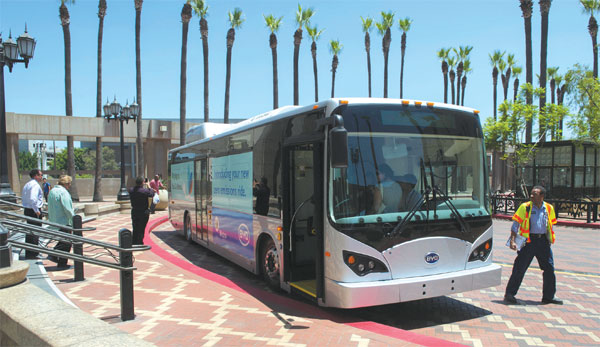
A BYD ebus in Los Angeles, California. The 12-meter ebus has already had trials in the United States, and in European cities including London, Paris, Bremen, Bonn, Madrid, Barcelona, Salzburg, Warsaw, Amsterdam, Brussels and Budapest, according to BYD. Yang Lei / Xinhua
|
|
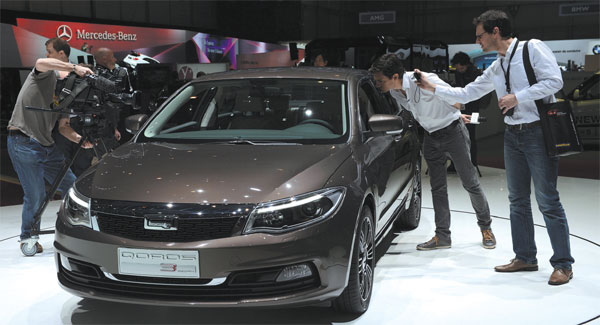
Qoros unveils its first series of models at the Geneva auto show in March last year, aiming at discerning young buyers in China and Europe. Wang Siwei / Xinhua
|
German automaker Daimler AG in November completed the purchase of a 12-percent stake in its Chinese partner BAIC Motor, the passenger car unit of BAIC Group, becoming the first foreign automaker to hold a significant equity position in a Chinese company.
Under the deal, Hubertus Troska, Daimler AG's management board member responsible for China, and Bodo Uebber, a member of the group's management board and chief financial officer, both have seats at the BAIC Motor board of directors.
The two companies also agreed that BAIC will increase its stake in their production joint venture Beijing Benz Automotive Co by 1 percent to 51 percent.
At the same time, Daimler will increase its share in newly integrated sales joint venture Beijing Mercedes-Benz Sales Service Co by 1 percent to 51 percent.
To further cement the partnership, the Beijing-based automaker is also mulling an investment in Daimler, said BAIC chairman Xu Heyi.
Daimler announced in August that it is investing 2 billion euros ($2.7 billion) in Beijing Benz to make it the largest Daimler production facility in the world by 2015, more than doubling the annual capacity to 200,000 units.
Dongfeng, Renault team for joint venture
Chinese carmaker Dongfeng and French Renault inked an operating deal in December for a 50-50 joint venture to produce vehicles and engines in Wuhan, Hubei province.
With a total investment of 7.76 billion yuan, Dongfeng Renault Automotive Co Ltd will produce 150,000 vehicles and 150,000 engines annually in the first phase, which is half of the capacity it will have when all phases are completed.
The venture plans to produce a range of new Renault vehicles, with SUVs slated first for production. It will also develop and promote new-energy cars and its own brands with Dongfeng. It plans to have a localization rate of more than 85 percent.
The venture will use the current sales channels for imported Renault cars to sell locally built vehicles and provide services. The distribution network will be expanded from the current 92 dealers to 120 by the first half of 2016, when production begins. The locally made vehicles may also be exported, subject to Renault's approval.
Four board members from Dongfeng and four from Renault will sit on the company's board of directors. Its CEO will be assigned by Dongfeng and Renault in rotation for a four-year term.
Homegrown Hongqi brand readied for revival
FAW Group in May officially launched its Hongqi H7 sedans in a bid to gain a slice of the lucrative high-end passenger car market, which is currently dominated by foreign brands.
The H7, released as part of the company's effort to revive the Hongqi, or Red Flag, is the country's first self-developed high-end passenger car model.
FAW introduced five H7 models, with prices ranging from 299,800 yuan to 479,800 yuan.
FAW Chairman Xu Jianyi said the H7 will first enter the business-car sector and then be available to the mass market to compete with foreign brands like Audi and Mercedes-Benz.
FAW launched the "Hongqi Revival" project in 2008 and by 2012, it had invested 5.2 billion yuan in the R&D of new models. It plans to invest another 10.5 billion yuan by 2015 to boost R&D and unveil more models.
Created in 1958 as China's top official vehicle, the Hongqi was used by national leaders at major celebrations as well as to transport important foreign guests including US president Richard Nixon during his landmark visit to China in 1972.
But production of the brand stopped in 1981 because of its fuel inefficiency and high cost.
BMW tests waters of electric market
BMW Brilliance released its independent brand, the Zinoro, in April. The brand name in Chinese is Zhinuo, which means commitment or promise.
Its first car, the pure-electric 1E was released in November and will hit the market in the first quarter of this year.
According to BMW, the car is "specially made in China and for China" because the country is headed toward green autos, though the switch to new technology takes time.
The models will be built in Shenyang, Liaoning province, where the BMW Brilliance joint venture now produces the BMW 3 Series and X1.
Zinoro will have a separate distribution channel, and the batteries will be sourced from China.
Analysts said the Zinoro is also likely to be sold to markets outside China.
BMW has been dedicated to bringing alternative-energy vehicles to China. This year, it will also introduce the i3 - an all-electric car under its wholly owned i sub-brand - to China through imports.
Tesla opens Beijing showroom, takes orders
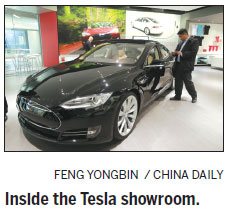
US electric carmaker Tesla opened its first showroom in China in November, taking pre-orders from customers at its Beijing location.
Located in the east of Beijing, the showroom now displays two Tesla Model S four-door sports cars.
Since last August, potential buyers have been able to sign a pre-order contract and put down a 250,000-yuan deposit to add their names to the waiting list. The sales will be launched next month.
Based in Palo Alto, California, the company may open a service center in Beijing to help support new showrooms planned in Shanghai, Shenzhen and other cities.
On Jan 22, Tesla announced the Model S would be priced at 734,000 yuan in China, defying previous estimates that it would cost upwards of 1 million yuan.
Tesla CEO Elon Musk said that the company expects sales in China to match its US volume by 2015.
In 2013, Tesla sold 22,300 Model S vehicles around the globe, far more than its initial target of 20,000 units.
The company hoped to double its annual sales in 2014 "with high expectations for the China market".
GM Shanghai plant to produce Cadillacs
General Motors broke ground on a new plant in Shanghai in June for the local production of Cadillac cars with the aim of strengthening its foothold in the Chinese luxury market.
The new plant, with a new R&D facility under the company's Pan-Asia Technical Automotive Center in the same location, has total investment of 8 billion yuan.
It has a planned annual capacity of 160,000 luxury vehicles. It will include a body shop, paint shop, general assembly shop, auxiliary facilities, and high-speed and brand experience center.
Cadillac has set goals of tripling its 2012 sales in China to 100,000 units by 2015 and increasing its share of China's luxury car market to 10 percent by 2020.
In 2013, Cadillac sales in China were up 66.6 percent from the previous year to a record 50,005 units. GM's luxury brand was led by the SRX, which sold 26,897 units, an increase of 24.0 percent. In addition, the ATS - which was introduced in November - sold 2,154 units in 2013.
BYD exploring foreign markets
Last year was a time of global expansion for BYD, a leading electric bus manufacturer from Shenzhen, which made headway in its efforts to break into mature Western markets, according to the company.
Its 12-meter electric bus - the ebus - has already had trials in the United States, and in European cities including London, Paris, Bremen, Bonn, Madrid, Barcelona, Salzburg, Warsaw, Amsterdam, Brussels and Budapest, according to BYD.
The trials demonstrate that the range of the model can comfortably exceed 250 km on a single charge in real urban conditions.
The performance has also been proven through extensive operations in China.
In Shenzhen 220 BYD ebuses have been in service since January 2011, traveling more than 20 million km, each carrying up to 120 passengers during rush hours with full air-conditioning in use.
The ebus not only produces zero emissions but also offers huge savings in operating costs. BYD said the bus uses about 130 kWh of electricity per 100 km in urban conditions.
The battery takes four to five hours to charge from a totally exhausted state, which costs the equivalent of about $32 in the UK when using peak-hour electricity, a savings of up to 75 percent compared to a diesel bus, said the company.
BYD added that its battery is designed to have a life of more than 4,000 charges, enough for 10 years or more under normal operating conditions.
Qoros Auto debuts in Geneva
Qoros Auto - the new independent carmaker from China - made its public debut in March at the Geneva Motor Show by unveiling the first in a series of new models aimed at discerning young buyers in China and Europe.
The 50-50 joint venture established in 2007 by China's Chery Automobile and Israel Corp presented the world premiere of its first production vehicle, a four-door compact car, the Qoros 3.
The company also unveiled two concept models - the Qoros 3 hybrid and Qoros 3 estate. It is aimed at competing with similar models from Volkswagen and Toyota.
Qoros will produce the sedan in Changshu, Jiangsu province, with an initial annual production of 150,000 units, rising to 450,000 units a year in future.
Boasting an international team with major design input from nine different automotive brands, Qoros plans to launch another new model in six to eight months.
The company said Qoros is dedicated to delivering high-quality cars in line with international standards through its unique business model.
In November, the company announced the prices of Qoros 3 - ranging from 119,900 yuan to 167,900 yuan. It will release the second production model at the approaching Geneva auto show in March.
Volvo unveils first locally made model
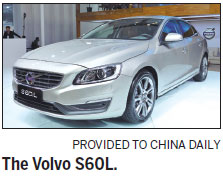
Volvo Car Corp unveiled its first locally built model S60L on Dec 13 in Beijing.
Made at its Chengdu plant, it is Volvo's first model produced outside Europe. In addition to the Chinese market, the model will also be exported to countries including the United States.
The move is expected to boost the brand's sales in China. It sold 61,146 units in 2013, a 45.6 percent rise from the previous year.
Volvo also has a new auto production facility in Daqing, Heilongjiang province, an engine plant in Zhangjiakou, Hebei province, and an R&D center in Shanghai.
The Daqing plant will produce sedans, SUVs and clean energy models, while the Zhangjiakou factory is designed to provide engines for the two plants in China.
Both the Daqing and Zhangjiakou plants are operated by a joint venture between Volvo and Geely. The Chengdu plant is affiliated with Zhejiang Haoqing Carmaking Factory, which is wholly owned by Geely.
Volvo Group has a 30 percent share in a joint venture with Geely that formed after the Chinese automaker acquired Volvo Car Corp in 2010.
Great Wall out-sells domestic competitors
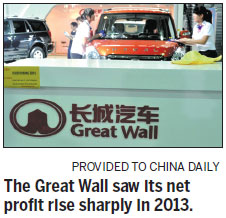
Great Wall Motor topped Chinese passenger vehicle brands in sales by selling 754,242 vehicles in 2013, a 21 percent rise from the previous year.
More than 410,000 Haval SUVs were sold in the year, contributing more than half of its sales figure.
The automaker's net profit reached 8.27 billion yuan in the year, a sharp rise of 45.24 percent from the year, which is possibly the highest profit rate in the global auto industry.
Great Wall Motor also made breakthroughs in research and development. Its diesel engine for its SUVs won a first prize in the Chinese auto industry science and technology awards in May.
The automaker has set an ambitious sales goal of selling 880,000 units in 2014, and it expects sales to reach 1.3 million by 2015.
(China Daily 02/17/2014 page18)
|